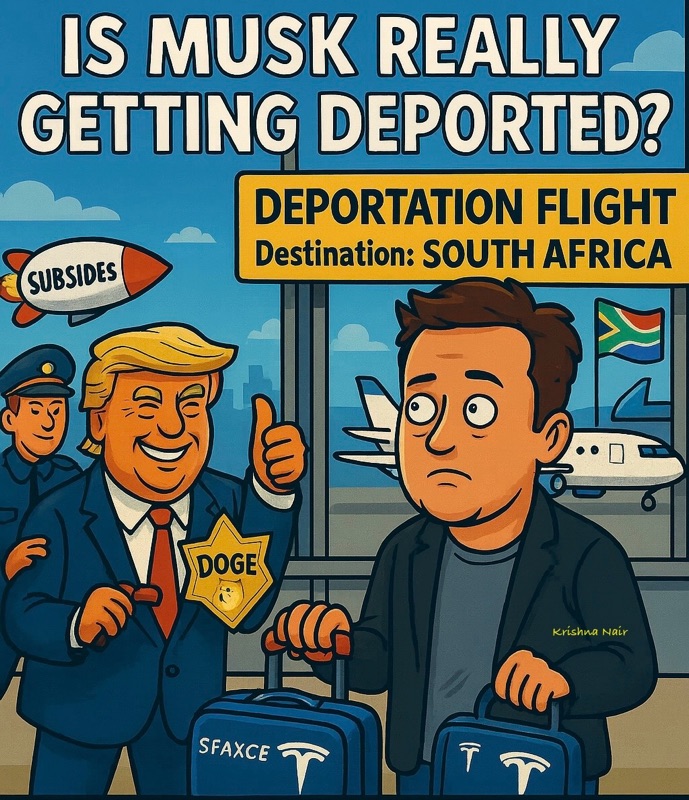
It’s not every day you see the world’s richest man and the world’s most headline-hungry ex-president square off over government contracts, but here we are: Donald Trump has publicly threatened to sic his so-called “Department of Government Efficiency” (DOGE—yes, really) on Elon Musk, even floating the idea of deporting him back to his native South Africa. This latest bout in the never-ending Musk-vs-Trump saga has sent shockwaves (and laughter) rippling across the globe.
Musk: Billionaire, Innovator, (Potential) Deportee?
It all started when Trump, who seems to have a love-hate relationship with Musk, posted a scathing attack on his Truth Social platform. Trump, never one to understate, claimed Musk has “enjoyed more subsidy than any human being in history” and hinted that, without American tax dollars, Elon might have to “close up shop and head back home to South Africa.” Forget about rocket launches, electric cars, or Starlink satellites—Trump suggests pulling the plug could save “a FORTUNE” for the American taxpayer.
And the punches didn’t stop there. With a typical Trumpian flourish, he threatened to set his “DOGE” on Musk, warning that “DOGE is the monster that might have to go back and eat Elon.” The question on everyone’s lips: Is Elon Musk really in danger of being deported by presidential decree? Or is this just another episode of “Celebrity Apprentice: White House Edition”?
The Subsidy Saga: Who Needs Whom?
Let’s cut through the bluster with some real figures. SpaceX, Musk’s crowning achievement, has received billions in government contracts—NASA alone has awarded SpaceX over $12 billion for its Commercial Crew and Cargo Programs, and that doesn’t include billions more for national security launches and Starlink services. Tesla, Musk’s electric vehicle venture, has benefitted from generous government subsidies and tax breaks for years, which have helped make electric cars mainstream.
But here’s the kicker: if Musk did take his rockets and run, NASA (and the entire US space programme) would be in serious trouble. SpaceX’s Dragon spacecraft is the main ride to the International Space Station for American astronauts. Boeing’s alternative, the Starliner, is still trying to get off the launchpad. The only other option? Hitching a lift with Russia’s Soyuz—a move not exactly in vogue these days.
Trump’s Bark and Musk’s Bite
Of course, Musk, never one to back down, responded with his usual bravado, insisting that “all subsidies should be cut”—a bold claim for someone whose businesses have thrived on them. In reality, Musk and Trump are more alike than either would care to admit: both thrive on drama, both see themselves as disruptors, and both have a habit of saying the quiet part out loud.
Yet beneath the theatrics, there are serious economic implications. If Trump were to make good on his threat (however unlikely), the US could lose its lead in commercial spaceflight, jeopardising not just SpaceX but a whole industry that employs tens of thousands and generates billions in economic activity. Meanwhile, Musk’s Tesla faces tumbling sales and rising competition—losing US subsidies could hit the company hard at a time when it can least afford it.
The Realities of Deportation and Drama
Let’s get real: no US president can simply deport a naturalised citizen like Musk. But in today’s political climate, facts often take a backseat to spectacle. What’s truly remarkable is the insight this public feud gives us into the precarious relationship between government and industry—especially when the industry in question is so closely tied to public funding.
According to Dennis Dick of Stock Trader Network, “Musk needs Trump, Trump does not need Musk.” If the subsidies stop, US jobs and technological dominance are on the line. And while Trump may threaten to “deport” Musk, it’s more likely he’s angling for concessions or just relishing the spotlight.
Lessons from the Launchpad
The Musk-Trump feud is a timely reminder that even the titans of industry are deeply entwined with public policy. Billions in subsidies, government contracts, and regulatory favours shape the fate of companies like SpaceX and Tesla. And while the drama makes for great headlines, the underlying stakes are anything but funny for the workers, engineers, and taxpayers who ultimately foot the bill.
In the end, Musk isn’t getting deported anytime soon (sorry, DOGE). But the episode highlights just how much big business depends on government support—even when the CEO insists he could go it alone. For now, the rockets will keep launching, the cars will keep rolling, and the tweets (and Truths) will keep flying.
But if Musk ever does get that one-way ticket back to South Africa, you can bet he’ll do it in style—perhaps on the first SpaceX flight to Mars.
References:
- NASA Contract Awards: NASA.gov
- Tesla Subsidies: Reuters
- US Government Support for SpaceX: Ars Technica


